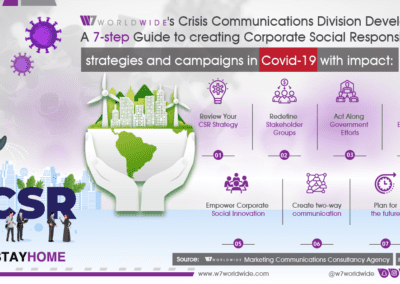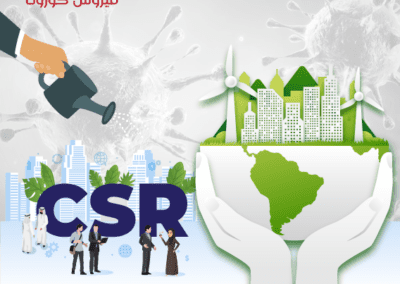Covid-19 has changed everything in respect of corporate social responsibility (CSR). People are more socially and environmentally aware, and all evidence suggests continued pressure on brands to align their communications with corporate values. CSR therefore needs to be a core element of the corporate communications strategies’ companies adopt as a way to future-proof their business and build trust in their brand.
The global crisis is a wake-up call for businesses to re-address their purpose and how they operate. This is important, not only so they can thrive today, but so they can be prepared and anticipate the future challenges. The Covid-19 pandemic has disrupted business operations in extraordinary ways. It also had an enormous impact on the types of businesses we decide to support, what we expect from them, and the kind of value exchange we want.
“The pandemic will accelerate CSR development in the long run and should be seen as an opportunity to rethink how organizations give back to their stakeholders and society while adapting their communications,” explains Abdulrahman Inayat, Co-Founder, and Director of W7Worldwide. “The new environment we live in requires new behaviour, a new way of life, and authentic interactions between people and organizations. In terms of current corporate communications priorities, Corporate Social Responsibility is emerging as the most important tool for companies to exercise successful public relations.”
The “7 CSR Strategies to Deploy in Covid-19” Guide produced by W7Worldwide urges organizations to review their current CSR strategy, reflecting on the post-pandemic world and ensuring it is brand-aligned, well-researched, responsive, partnership-driven, and pursuit of relevant positive impacts. The crisis has clearly illustrated who should be regarded as the most essential stakeholders of the business, therefore CSR stakeholder mapping is the first phase in engagement. Covid-19 is a significant new social responsibility for the corporate sector, which now needs to act alongside the government as a key stakeholder to rebuild the economy better while taking the opportunity to solve problems like climate change.
Furthermore, the report recommends that companies continue to put employees first and engage their workforce with the wider purpose of the organization. Innovation in strategic CSR presents opportunity and competitive advantage, rather than a cost burden when built into the overall business model. Getting the word out about a company’s CSR initiatives is a powerful branding tool to demonstrate industry leadership and build connections with relevant target audiences. Businesses should carefully evaluate which of their resources and abilities are most suited to the current situation. The pandemic offers great opportunities for organizations to be the catalysts to bring in a new era of CSR development in the long run.
A pioneer in integrated HVAC systems, Al Salem Johnson Controls has the world’s second-largest cooling station at the Holy Mosque of Mecca and one of the largest cooling stations in the world at the Prophet’s Mosque in Medina. Among its various Covid-19 CSR efforts, the company supported 21 government and private hospitals through a maintenance initiative in cooperation with the Ministry of Health, providing free inspection and repair services for all types of commercial and industrial chillers and other HVACR units located in hospitals across seven major cities.



